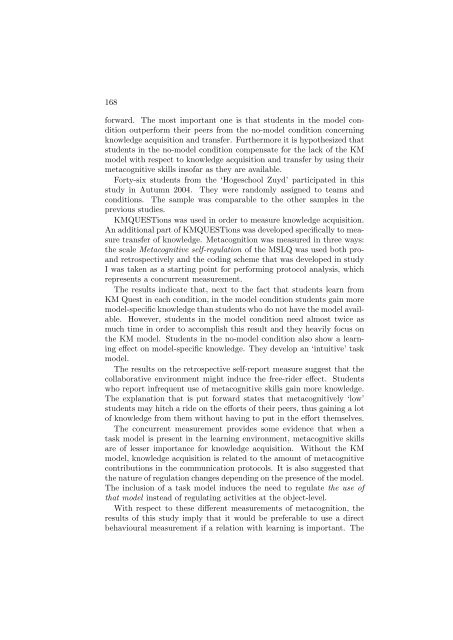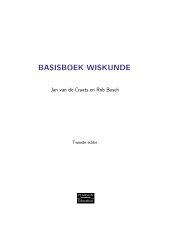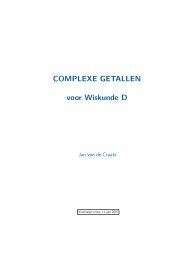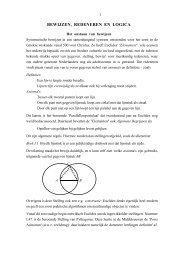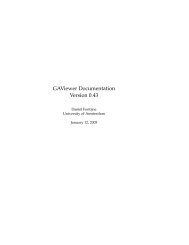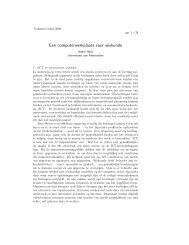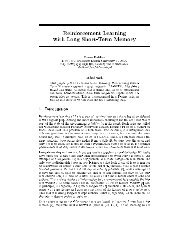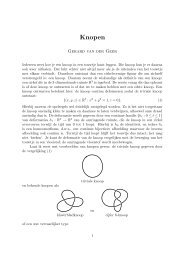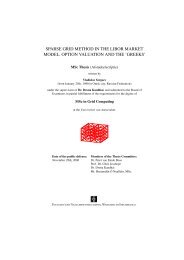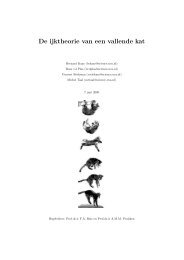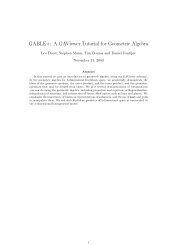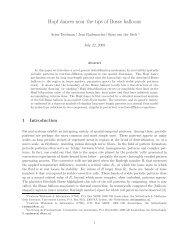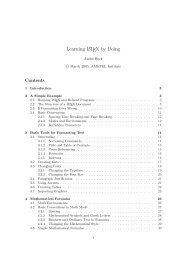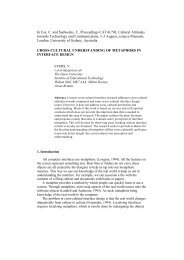The role of metacognitive skills in learning to solve problems
The role of metacognitive skills in learning to solve problems
The role of metacognitive skills in learning to solve problems
You also want an ePaper? Increase the reach of your titles
YUMPU automatically turns print PDFs into web optimized ePapers that Google loves.
168<br />
forward. <strong>The</strong> most important one is that students <strong>in</strong> the model condition<br />
outperform their peers from the no-model condition concern<strong>in</strong>g<br />
knowledge acquisition and transfer. Furthermore it is hypothesized that<br />
students <strong>in</strong> the no-model condition compensate for the lack <strong>of</strong> the KM<br />
model with respect <strong>to</strong> knowledge acquisition and transfer by us<strong>in</strong>g their<br />
<strong>metacognitive</strong> <strong>skills</strong> <strong>in</strong>s<strong>of</strong>ar as they are available.<br />
Forty-six students from the ‘Hogeschool Zuyd’ participated <strong>in</strong> this<br />
study <strong>in</strong> Autumn 2004. <strong>The</strong>y were randomly assigned <strong>to</strong> teams and<br />
conditions. <strong>The</strong> sample was comparable <strong>to</strong> the other samples <strong>in</strong> the<br />
previous studies.<br />
KMQUESTions was used <strong>in</strong> order <strong>to</strong> measure knowledge acquisition.<br />
An additional part <strong>of</strong> KMQUESTions was developed specifically <strong>to</strong> measure<br />
transfer <strong>of</strong> knowledge. Metacognition was measured <strong>in</strong> three ways:<br />
the scale Metacognitive self-regulation <strong>of</strong> the MSLQ was used both proand<br />
retrospectively and the cod<strong>in</strong>g scheme that was developed <strong>in</strong> study<br />
I was taken as a start<strong>in</strong>g po<strong>in</strong>t for perform<strong>in</strong>g pro<strong>to</strong>col analysis, which<br />
represents a concurrent measurement.<br />
<strong>The</strong> results <strong>in</strong>dicate that, next <strong>to</strong> the fact that students learn from<br />
KM Quest <strong>in</strong> each condition, <strong>in</strong> the model condition students ga<strong>in</strong> more<br />
model-specific knowledge than students who do not have the model available.<br />
However, students <strong>in</strong> the model condition need almost twice as<br />
much time <strong>in</strong> order <strong>to</strong> accomplish this result and they heavily focus on<br />
the KM model. Students <strong>in</strong> the no-model condition also show a learn<strong>in</strong>g<br />
effect on model-specific knowledge. <strong>The</strong>y develop an ‘<strong>in</strong>tuitive’ task<br />
model.<br />
<strong>The</strong> results on the retrospective self-report measure suggest that the<br />
collaborative environment might <strong>in</strong>duce the free-rider effect. Students<br />
who report <strong>in</strong>frequent use <strong>of</strong> <strong>metacognitive</strong> <strong>skills</strong> ga<strong>in</strong> more knowledge.<br />
<strong>The</strong> explanation that is put forward states that <strong>metacognitive</strong>ly ‘low’<br />
students may hitch a ride on the efforts <strong>of</strong> their peers, thus ga<strong>in</strong><strong>in</strong>g a lot<br />
<strong>of</strong> knowledge from them without hav<strong>in</strong>g <strong>to</strong> put <strong>in</strong> the effort themselves.<br />
<strong>The</strong> concurrent measurement provides some evidence that when a<br />
task model is present <strong>in</strong> the learn<strong>in</strong>g environment, <strong>metacognitive</strong> <strong>skills</strong><br />
are <strong>of</strong> lesser importance for knowledge acquisition. Without the KM<br />
model, knowledge acquisition is related <strong>to</strong> the amount <strong>of</strong> <strong>metacognitive</strong><br />
contributions <strong>in</strong> the communication pro<strong>to</strong>cols. It is also suggested that<br />
the nature <strong>of</strong> regulation changes depend<strong>in</strong>g on the presence <strong>of</strong> the model.<br />
<strong>The</strong> <strong>in</strong>clusion <strong>of</strong> a task model <strong>in</strong>duces the need <strong>to</strong> regulate the use <strong>of</strong><br />
that model <strong>in</strong>stead <strong>of</strong> regulat<strong>in</strong>g activities at the object-level.<br />
With respect <strong>to</strong> these different measurements <strong>of</strong> metacognition, the<br />
results <strong>of</strong> this study imply that it would be preferable <strong>to</strong> use a direct<br />
behavioural measurement if a relation with learn<strong>in</strong>g is important. <strong>The</strong>


